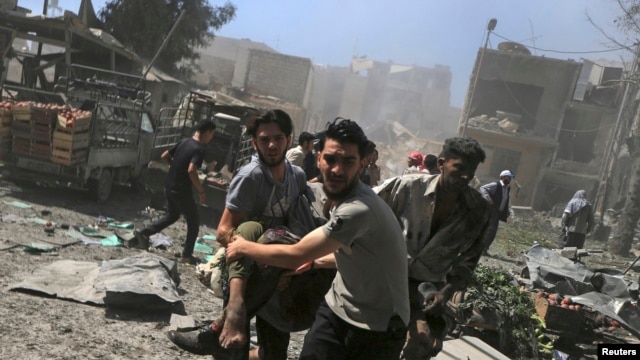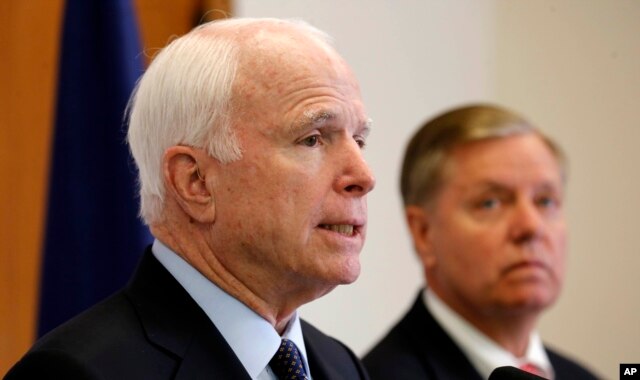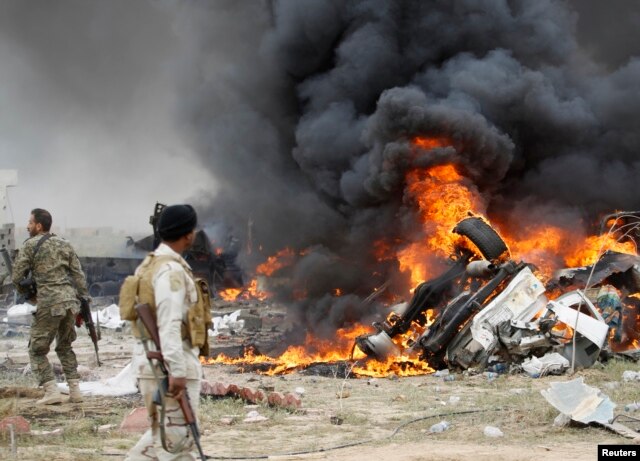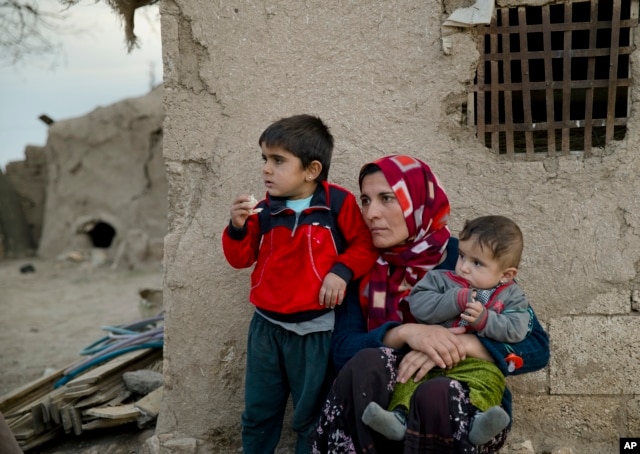News / Middle East
US Senators Call for Multinational Force in Syria
FILE - Men transport a casualty after what activists said were airstrikes by forces loyal to Syria's President Bashar al-Assad on a busy marketplace in Douma, near Damascus, Syria, Aug. 12, 2015.
November 30, 2015 1:43 AM
WASHINGTON—
Two U.S. Senators Sunday said the United States should be part of a multinational force in Iraq and Syria to defeat the Islamic State (IS/ISIS/ISIL) and pressure Syrian President Bashar al-Assad out of power. The comments follow an essay by a U.S. foreign policy scholar arguing the need for up to 50,000 U.S. troops, initially, to confront the IS group and create a safe zone for Syrian refugees.
Senators John McCain and Lindsey Graham, both Republicans, told U.S. television from Baghdad Sunday the U.S. must take part in a multinational force that McCain, chairman of the Armed Services Committee, said will have two key objectives.
"First, you have to, obviously, take out ISIS but, at the same time, you have to establish a no-fly zone that sends a message to Bashar al-Assad that he can stop barrel-bombing and slaughtering innocent men, women and children and driving millions into refugee status, which we are trying to cope with now," said McCain.
FILE - Republican presidential candidate Sen. Lindsey Graham, R-S.C. listens at right as former Republican presidential nominee, Sen. John McCain, R-Ariz. talks about his support for Graham during a campaign stop, Friday, Sept. 11, 2015, in Manchester, N
Graham, also a member of the Armed Services Committee, was asked if the American people are prepared for another US ground commitment following the conflicts in Iraq and Afghanistan.
"They better be because, if we don’t destroy ISIL in Syria which is their headquarters, we’re going to get attacked at home. So, the region is ready to fight. The region hates ISIL. They’re coming after the Sunni Arab nations and Turkey hates ISIL. The entire region wants Assad gone. So, there’s an opportunity here with some American leadership to do two things, which is to destroy ISIL before we get hit at home and also to push Assad out, and I can’t overemphasize the influence of Iran. We’ve been here a day and a half. Iran is all over Iraq. They have filled in the vacuum created when we left and the region is very worried about Iranian dominance as well as ISIL," said Graham.
FILE - Shi'ite fighters known as Hashid Shaabi look at smoke from an explosives-laden military vehicle driven by an Islamic State suicide bomber which exploded during an attack on the southern edge of Tikrit.
Both McCain and Graham suggest the force required may need to be as high as 100,000, but Graham added that it would be comprised mostly of regional troops.
"The kind of force that John and I are talking about is, 10 percent of the force would come from Western powers. The force we’re talking about will come from regional armies. There are large regional armies. Saudi Arabia, Egypt, Turkey, they have regional armies. They would go into the fight if you put Assad on the table. So, most of the fighting would be done by the region," said Graham.
Graham said the estimated 3500 U.S. troops in Iraq are insufficient to beating the Islamic State any time soon.
McCain said he believes the provincial Iraqi capital of Ramadi, now in IS hands, will be taken back soon.
"But, that’s only the beginning. There’s Fallujah, there’s Mosul and others. We need a more robust presence and Bashar al-Assad is a major cause of the refugees which are now flooding Europe and cause such consternation in the United States. A no-fly zone will provide a refuge at least for some of these refugees," said McCain.
FILE - Members of a Syrian Kurdish refugee family from Kobani sit in the village of Alanyurt on the Turkish side of the Turkey-Syria border.
Middle East Institute scholar Zubair Iqbal sees obstacles to creation of such a multinational force.
"How do you mobilize such a large force in a region which has been largely bereft of a unified policy, number one, number two, these countries really have very much their own very narrow interests, and they’re not going to be able to collaborate together and the question always will be who leads this force. The second issue, which is really important, is what do you do after you’ve defeated the Islamic State? Do you have in place a strategy, a program whereby the peace will be restored and the forces which have given rise to the Islamic State will disappear somehow or other? So, these are important issues," said Iqbal.
Iqbal added that without first understanding the causes that have given rise to the Islamic State, such a multinational force could only serve to complicate matters if it bolsters IS propaganda that Muslims are under attack by the West.
Meanwhile, Brookings Institution foreign policy scholar Robert Kagan, writing in The Wall Street Journal, warns the Islamic State has not been confined to the Middle East. He said the November 13 attacks in Paris have proven that the IS group is both durable and capable.
He said the Islamic State threatens the cohesion of Europe and the trans-Atlantic community. Kagan said a U.S. force, numbering up to 50,000, will need to establish a safe zone in Syria while supporting local forces in uprooting the Islamic State. He expresses hope that eventually those U.S. troops could be replaced by European, Turkish, Saudi and other Arab forces.VOA NEWS






No comments:
Post a Comment